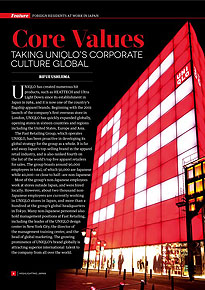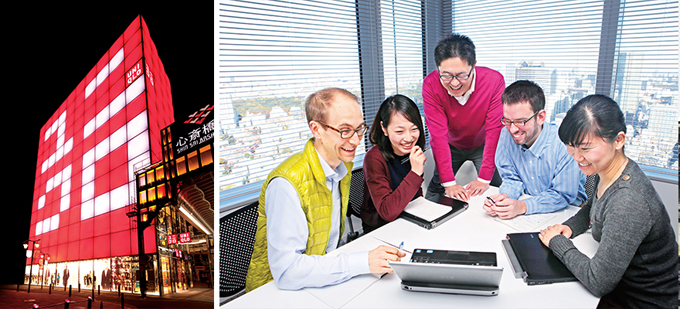Home > Highlighting JAPAN >Highlighting Japan October 2014>Foreign residents at work in Japan
Highlighting JAPAN

Foreign residents at work in Japan
Core Values
Taking Uniqlo’s corporate culture global

Uniqlo has created numerous hit products, such as HEATTECH and Ultra Light Down since its establishment in Japan in 1984, and it is now one of the country’s flagship apparel brands. Beginning with the 2001 launch of the company’s first overseas store in London, UNIQLO has quickly expanded globally, opening stores in sixteen countries and regions including the United States, Europe and Asia.
The Fast Retailing Group, which operates UNIQLO, has been proactive in developing its global strategy for the group as a whole. It is far and away Japan’s top-selling brand in the apparel retail industry, and is also ranked fourth on the list of the world’s top five apparel retailers for sales. The group boasts around 90,000 employees in total, of which 50,000 are Japanese while 40,000—or close to half—are non-Japanese.
Most of the group’s non-Japanese employees work at stores outside Japan, and were hired locally. However, about two thousand non-Japanese employees are currently working in UNIQLO stores in Japan, and more than a hundred at the group’s global headquarters in Tokyo. Many non-Japanese personnel also hold management positions at Fast Retailing, including the leader of the UNIQLO design center in New York City, the director of the management training center, and the head of global marketing. The growing prominence of UNIQLO’s brand globally is attracting superior international talent to the company from all over the world.
Jun Yokohama, executive vice president in charge of human resources at Fast Retailing, speaks of the challenges of nurturing a diverse workforce. “It’s only natural to globalize to communicate the quality of the UNIQLO brand worldwide. And we have high expectations of our staff at UNIQLO stores—they’re responsible for implementing the high standards set for the beauty of the interior, the selection of items available, and the accessibility of the displays.”
He adds that many non-Japanese are surprised at the company’s expectations. “Some struggle to understand the value of our attention to detail in customer service, which is underpinned by Japanese cultural traditions. This is where training and communication become important to maintain consistent standards worldwide, while effectively localizing our business.”
Another issue that non-Japanese staff find difficult to comprehend is the Japanese way of working. “As one example, employees from overseas tend to feel that their job responsibilities are unclear, and it is true that in many Japanese organizations roles are not as defined as they would be in Western organizations,” says Yokohama. “We place a strong emphasis on teamwork in Japan, and all of our employees are constantly improving themselves and striving for smoother communication with staff with different cultural backgrounds.”
Communicating with people from different backgrounds can lead to misunderstandings for those not accustomed to it, Yokohama notes. “Patience, perseverance and clarity on both sides are essential.” Using Japanese is of course fine between Japanese employees, but many staff are studying English, showing their focus on the larger global picture.
When globalizing a business, there is a tendency to think only of adapting to global standards. However, in the case of Fast Retailing, a brand originating in Japan, their efforts to promote understanding of Japanese culture and values abroad while taking on aspects of established global business practices may offer another path to globalization. To communicate the advantages of Japan to non-Japanese employees working here, it is imperative that Japanese people converse effectively with non-Japanese workers. To accomplish this, Japanese should strive to deepen their understanding of their own culture and acknowledge the cultural differences between themselves and non-Japanese employees.
© 2009 Cabinet Office, Government of Japan






